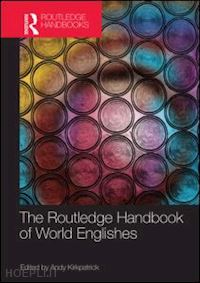Introduction Andy Kirkpatrick Section 1 Historical Perspectives and ‘Traditional’ Englishes 1. Standardized English: The History of the Earlier Circles Daniel R. Davis 2. Grammatical Variation in the Contemporary Spoken English of England David Britain 3. Phonological Innovation in Contemporary Spoken English Gerry Docherty 4. The Englishes of Ireland: Emergence and Transportation Raymond Hickey 5. The Development of Standard American English Bill Kretzschmar 6. The Englishes of Canada Stephen Levey 7. English in Australia Kate Burridge 8. The Englishes of New Zealand: Migrant and Maori Margaret Maclagan Section 2: Regional Varieties 9. The development of the English language in India Prof. Dr. Joybrato Mukherjee 10. Sri Lankan Englishes Dushyanthi Mendis and Harshana Rumbukwella 11. East and West African Englishes: Differences and Commonalities Hans-Georg Wolf 12. The Development of English in Botswana: Language Policy and Education Birgit Smieja and Joyce T. Mathangwane 13. Singaporean and Malaysian Englishes: Differences and Similarities Low Ee Ling 14. Periphery ELT: The Policy and Practice of English Teaching in the Philippines Isabel Martin 15. East Asian Englishes: Japan and Korea Yuko Takeshita 16. Chinese Englishes:A Future Power? Marc Xu Zhichang 17. Slavic Englishes: Education or Culture? Zoya Proshina 18. West Indian Englishes: An Introduction to Literature Written in Selected Varieties Hazel Simmons-McDonald 19. English and English Teaching in Colombia: Tensions and Possibilities in the Expanding Circle Adriana González Section Three: Emerging Trends and Themes 20. Lingua Franca English – the European Context Barbara Seidlhofer 21. Developmental Patterns of English: Similar or Different? Edgar Schneider 22. Variation Across Englishes: Phonology David Deterding 23. Variation Across Englishes: Syntax Bernd Kortmann 24. Mixed Codes and /or Varieties of English? James McLellan 25. Semantics and Pragmatic Conceptualisations Within An Emerging Variety: Persian English Farzad Sharifian Section 4: Contemporary Contexts, Functions and Variables 26. ‘In Defence of Foreigness’ Ha Jin 27. ‘Writing in Englishes’ Tope Omoniyi 28. On-line Englishes Mark Warschauer, Rebecca Black, and Yen-Lin Chou 29. The Englishes of Business Catherine Nickerson 30. Englishes in Advertising Azirah Hashi 31. The Englishes of Popular Cultures Andrew Moody 32. Thank You for Calling: Asian Englishes and ‘Native-like’ Performance in Asian Call Centres Kingsley Bolton Section 5: Debates and Pedagogical Implications 33. Which Norms in Everyday Practice – and Why? Ruanni Tupas 34. Construing Meaning in World Englishes Ahmar Mahboob 35. Which Test of Which English and Why? Brian Tomlinson 36. When Does An Unconventional Form Become an Innovation? David CS Li 37. Academic Englishes:A Standardised Knowledge? Anna Mauranen, Carmen Pérez-Llantada and John M. Swales 38. Which Language: When and Why? Augustin Simo Bobda Section 6: The Future 39. The Future of Englishes: One, Many or None? Alastair Pennycook












